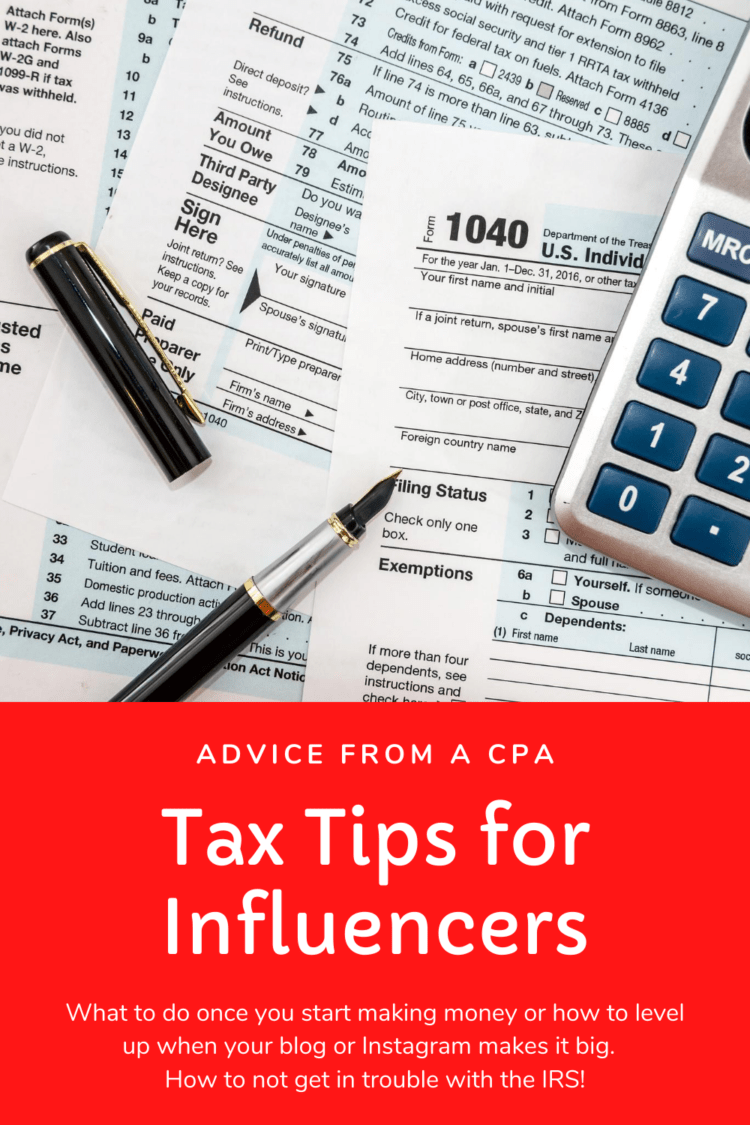TTax Tips for Influencers from a CPA

When I get together with fellow bloggers, influencers, and content creators, the conversation always turns to business. And I always bring up taxes. In fact, my friends often come to me for tax tips for influencers. Whether you realize it or not, once you monetize your blog or accept payment from brands as an influencer. you have created a business and you need to pay taxes.
If you think the IRS won’t care about your little blog or Instagram account, you’re wrong. My blog back when it was very little was audited. I’ve learned a lot over the years as a blogger and influencer. The person I learned a lot from is accountant Paul Mianulli. I asked him to write an article offering the best tax tips for influencers from a certified accountant.
You may also like: how blogs and influencers make money
The Best Tax Tips for Influencers
By Paul Mianulli CFP®
I want to share some of the important issues we observed as our staff worked through hundreds of tax returns from members of the blogging and influencer community. Our firm specializes in the accounting needs of self-employed folks. We saw early on that bloggers would have special accounting and tax needs beyond what the typical self-employed person faces on a day-to-day basis.
It’s a real joy for us to watch our clients grow even larger into the influencing space – and to see their incomes grow as well. Let’s get right to some of the most important and easy-to-implement strategies that can keep you out of trouble as you grow your influencer business.
How to run your blog like a business
Your blogging and/or influencer activity must be run as a business. Whichever business entity you have chosen (e.g., Sole Proprietor, Partnership, LLC, Corporation, or even if you haven’t yet decided), you must be consistent in your accounting. When we represent bloggers at audits, this is generally the first thing the auditor looks at because if you’re not treating your activity as a business, don’t expect the IRS to. That means you would not be entitled to the many wonderful and significant benefits the tax code offers business filers.
My experience has been that many traditional accounting firms don’t fully grasp the intangible nature of what occurs in the blogging universe. Unlike a customer at a brick-and-mortar store, your next customer, although thousands of miles away, is just a click away.
Since you will likely be generating income from all over the US (and even the world), it may make sense to establish a business entity but register it in a state other than the one you reside in. We often find this to be the case with our clients who have internet-based businesses. If you need help with this process, contact our firm and we can guide you through the process – or even do it all for you virtually.
How do I report income as an influencer?
You must report all of your income from whatever source. This is probably the issue that triggers the most audits. Many don’t understand that the IRS has many tools at its disposal now for determining if you are reporting all your income, so it makes sense to report it properly. Besides, you can take many legitimate deductions, and odds are, you’re missing many of them. This leads to our next item…
How do I track my expenses as an influencer?
You need to properly document what it’s costing you to run your business. The law requires that you keep books and records. Yes, this means saving receipts. Many of our clients now just snap a picture of the receipt with their phone and immediately send it to Evernote, OneNote, Dropbox, Google Docs, etc. This is particularly important with the thermal-printed receipts we often get now, which tend to fade, especially at warmer temperatures.
We have had the IRS deny expenses because the receipts documenting the expenditure had faded to the point that they were not legible. Please keep in mind that your credit card statement is NOT sufficient to document your business expenses. The IRS will want the details that are found on the receipt.
The good news is that expenses related to running your business, including marketing and auto mileage, are normally deductible, provided you do it properly. This includes travel and meetings with brands and other bloggers. Different rules apply to purchasing capital assets such as desks, furniture, computers, cameras, etc., which must be depreciated. If you run your business from your home as many bloggers do, you can potentially deduct such things as homeowner’s insurance, utilities, and trash pick-up, provided you meet the IRS requirements for doing so. Professional fees for business-related advice and services (e.g., accounting) are also deductible.
What forms and tax documents do I need as an influencer?
Make sure that you issue a Form 1099 to individuals, law firms, or entities that you pay. The rules for this are somewhat complicated and there is good information on the IRS website. The IRS is using these now to verify the deductions you are claiming on your return.
I’m amazed at how many accounting firms drop the ball here and get their clients in trouble. If you want to keep the IRS off your back and give the impression that you’re maintaining good books and records, this is a great way to do it — and the tax code requires that you file the forms and mail a copy to the recipient.
Are there ways to reduce my taxes as an influencer?
Now for the good news. There are many perfectly legal techniques for significantly reducing your tax liability. Add a few days of vacation to a business trip, and all of the airfare is usually deductible. Have your business establish a retirement plan for you and, when properly set up, take a full deduction for it.
We’re just scratching the surface here. Our clients have significantly reduced their tax burden by employing simple strategies, often with minimal or no change in their day-to-day operations. Find a trusted tax professional who can guide you through this process and you will see the benefit quickly.
As an influencer, do I need to pay quarterly estimated taxes?
The last item for this summary is to ensure you file and pay quarterly estimated taxes (federal and state). It really isn’t complicated and will save you grief and penalties (and interest) if you just do it. You can find the due dates and the necessary federal forms on the IRS website. Many influencers just have their accountants prepare the filings for them.
I hope these tax tips for influencers, bloggers, and content creators help you in making the tax season less stressful, your taxes reduced, and the whole process of filing for taxes as a small business much simpler!
The information contained in this article applies to US tax law and is for general information purposes only. Your circumstances may be different from those described. Consult with a professional familiar with your unique situation.







I once had a small business – store front, employees, the whole enchilada. I did not have trouble with the IRS at all but I got in a lot of trouble with my state over sales tax. if you are required to collect sales tax, keep that money in a separate bank account and do not touch it, no matter what! Because my business was struggling, I did dip into the sales tax money. I didn’t have enough $ to pay the state when the next quarterly payment was due. The problem snowballed from there. I ended up having to close my business over than damn sales tax. California, at least, is really nasty about this, and will shut you down if you get too delinquent in your sales tax payments.
Please, don’t lose your business over this!
I still maintain that I was a manufacturer, not a re-seller and should not have been required to collect sales tax. But that is a whole other subject that I will not get into here.
Best of luck to all you business owners out there, bloggers and otherwise!
Chris
This post is so timely as I am wanting to start both a blog and my own business. Thank you Allie and Paul!
Great advice for owners of even the smallest business venture. Thank you, Paul. I’m keeping a copy of this for my own files.
When my eBay business was running full blast, I paid my fair share of taxes thanks to my CPA who was great with reminders on what I had to track throughout the year, not just sales. There was maintaining inventory costs of items sold and unsold, mileage, internet provider fees, cost of ink, paper, etc., etc. Bottom line–I maintained several spreadsheets that I had to have at the ready come tax time. The IRS sees a business as a business, regardless of how big or small or how much profit you make.
Wow! These are great tips. I got in trouble because of the quarterly tax thing. Thankfully I had the money to pay the penalties. The IRS gets serious when they want their money. Be careful out there.
Quarterly tax penalties are so annoying. I got an unanticipated large payment in the 4th quarter of the year, and was assessed a penalty because I hadn’t paid estimated taxes throughout the year 🙁 IMO the rules are written to favor the state on that kind of situation.
File form 2210 with your tax return. It allows you to allocate your income to the proper period, rather than it being spread evenly and causing a penalty.